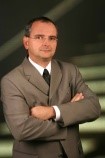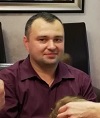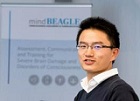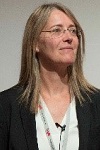g.tec medical engineering GmbH & Guger Technologies OG, Austria
Department of Energy Utilization, Electrical Drives and Industrial Automation (EUEDIA) Faculty of Electrical Engineering, Iasi, Romania
g.tec medical engineering GmbH & Guger Technologies OG, Austria
Albert-Ludwigs Universität Freiburg, Germany
g.tec medical engineering GmbH & Guger Technologies OG, Austria
Lately, Brain Computer Interface (BCI) systems become increasingly used in the context of stroke rehabilitation. Many BCI systems are based on motor imagery activity recorded from the sensorimotor cortex, which is translated into continuous control signals for rehabilitation devices.
The tutorial will review current stroke rehabilitation using BCI technology and will provide insight into technology, experimental setups, results and outcomes of patient studies.
Some patients diagnosed as vegetative are reclassified as (at least) minimally conscious when assessed by expert teams. A further subset of potentially communicative non-responsive patients might be undetectable through standard clinical testing. Other patients might have transient periods of relative wakefulness, but remain unaware of their surroundings. The tutorial will provide an overview of BCI technology to identify non-responsive patients that might be able to communicate and use the technology as an assessment tool.
General principles of BCI for stroke rehabilitation, coma assessment and communication will be explained, so the audience will get an inside in the topic.
Further participants will be able to understand the target patient group. Participants will learn about state-of-the art in BCI stroke rehabilitation, coma assessment and communication.
Main content:
The goal of the tutorial is to bring together researchers and interested attendees, to describe and demonstrate the options available in the field of Brain Computer Interfaces. We will highlight the usability and reliability of BCI control, which now allows developing and displaying more advanced applications. We think that such a tutorial will be very appealing to audience members working in the area of HCI combining different modalities for interactions, including the medical field.

Dr. Guenter Edlinger studied control engineering at the University of Technology Graz and carried out research work at the Institute of Biomedical Engineering (Prof. Pfurtscheller) at the University of Technology Graz. He worked there as an assistant professor and teacher and received his PhD degree in 1998. The topic of his PhD work was the design of High-Resolution EEG systems. He is co-founder of g.tec. He has been responsible for R&D with special emphasis on the development and production of medical systems for over 20 years.

Dr. Danut Irimia studied electrical engineering at Gheroghe Asachi Technical University of Iasi, Romania. In 2012 he received the PhD degree in Electrical Engineering, and since then he dealt with research and development for different neurorehabilitation devices. He is currently a Lecturer within the same University where he teaches System Theory, Robotics and Human-Machine Interaction. His research interests and expertise include Brain-Computer Interfaces for communication and rehabilitation, Human-Machine interaction, Functional Electrical Stimulation, neuroprosthetics and rehabilitation robotics.

Dr. Ren Xu received the PhD degree in applied computer science from University of Goettingen, Germany, after his MSc study in information and signal processing at Chinese Academy of Sciences. Since 2015, he has been working as a Senior Scientist at Guger Technologies OG, Austria, and he is also a Marie Curie Individual Fellow. His main research interests include biomedical signal processing, brain-computer interface and its application on stroke rehabilitation and consciousness assessment.

Professor Natalie Mrachacz-Kersting received her PhD in Biomedical Science and Engineering from The University of Aalborg, Denmark in 2005 and held several post-doc positions at the University of Auckland, New Zealand and Aalborg University, Denmark. From 2007 she was Associate Professor at the Center for Sensory-Motor Interaction, Aalborg University, until she moved to the University of Applied Sciences and Arts Dortmund, Germany as Full Professor in Neuroscience and Medical Technologies. Her research focuses on neurorehabilitation technology, and neural control of movement. Within these areas, she has (co)-authored approximately 70 papers in peer-reviewed Journals and >150 conference abstracts and papers. She was the recipient of the International Award in Brain-Computer-Interfaces in 2017 and has received several prestigious grants from the Innovation Fond of Denmark, Kong Christian den Tiendes Fond, Lundbeck Fond and the Obel Family Foundation of Denmark. She is currently Associate-Editor of several journals including Brain-Computer-Interfaces, the Scandinavian Journal of Medicine and Science in Sports and Brain-Computer Interfaces - specialty section of Frontiers in Human Neuroscience.

Martin Walchshofer, MSc. studied biomedical engineering (Healthcare and Rehabilitation Technology) at the university of applied sciences Technikum Wien. Since 2016, he has been working at g.tec as software developer. His main interests include biomedical engineering, signal processing and software development.